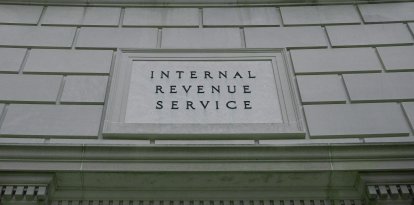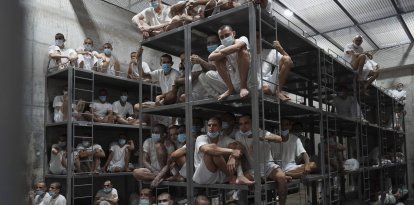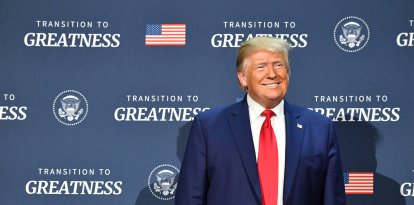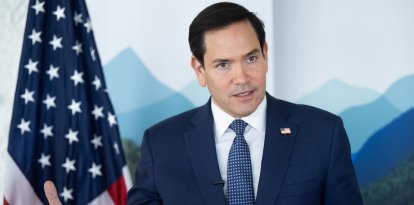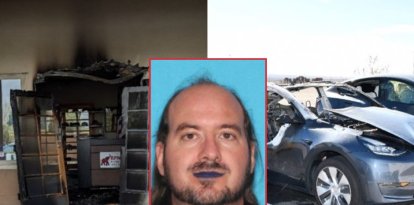Taking the pulse of the Latino vote in Pennsylvania, the group that could determine the 2024 winner of the key state
With mere weeks to go before the presidential election, pollster Nate Silver suggests that whoever wins the Keystone State has more than a 90% chance of making it to the White House.

An estimated 580,000 Latinos are eligible to vote in Pennsylvania/Christopher Brown
With the presidential election just weeks away, Pennsylvania is expected to be key within the group of swing states. According to pollster Nate Silver, whoever wins the Keystone State has more than a 90% chance of making it to the White House, making its importance even clearer when it comes to defining the winner between Donald Trump and Kamala Harris. However, Latinos in the state are expected to be the ones who end up tipping the balance at the polls.
The latest polls show a very close race, albeit with the trend in Trump's favor. He recently moved into the lead in Fivethirtyeight's Nate Silver forecast and is increasingly supported by betting markets such as Polymarket.
As for Latino voters, polls show the former president making the best choice for a Republican among this group since 2004, when George W. Bush won 40% of the coveted Latino vote, today more envied than ever by Trump and Harris.
Pennsylvania's Latino vote in numbers
Currently, Pennsylvania has a Latino population of 5%, an approximate 1.1 million people, of which 580,000 are eligible to vote. According to data from the University of California at Los Angeles (UCLA) Institute for Latino Politics and Policy, the state has the 10th largest population of eligible Latino voters.
In the 2020 election, Joe Biden beat Trump in Pennsylvania by just 80,555 votes. Considering that the Democrat then took 75% of the Latino vote to Trump's 25%, the importance of this demographic will be more important than ever in an election that is expected to be very close in the Keystone State.
As for the demographics of Latino voters living in the state, it seems to lean more favorable to the Democratic Party.
Nationwide, Mexicans represent 60% of Latinos. Second place goes to Puerto Ricans with 9.5%, followed by Cubans, Dominicans and Salvadorans, all with 4%. However, the numbers are quite different in Pennsylvania. According to the UCLA data, 53% of Latinos in the state are Puerto Rican, 13% identify as Mexican, 11% as Dominican and 3% Cuban.
In terms of party preference, it is no secret that Mexicans and Puerto Ricans have been more loyal to the Democrats, while Cubans and Venezuelans lean more toward the Republican Party due to their experiences in countries with socialist regimes.
Rafael Collazo, a Pennsylvania political strategist, recently spoke with NPR and explained the reasons behind the affinity among the Puerto Rican community for the Democratic Party.
"The first families that came here (to Philadelphia) belonged to unions. They were big-city Democrats. Therefore, the orientation of Latino voters at that time was more homogeneous and more Democratic," he said.
"The road to the White House goes through Pennsylvania's Latino neighborhoods"
Pennsylvania Latinos could be decisive, both for the outcome of the state and the presidential election itself.
"The difference now is that the election is very close and Latinos have spread out across the country," Luis A. Miranda Jr., president of Latino Victory, a progressive organization based in Washington, DC. "The road to the White House goes through Latino neighborhoods in Pennsylvania," he added.
Collazo has a very similar perception to Miranda Jr.'s, also understanding that Hispanic voters could be decisive on Nov. 5. "It's clear that the Latino vote in Pennsylvania will determine who wins this election," he added.
Warning signs for Harris-Walz campaign among Latino men
Polls also show a strong tailwind for Trump among Latino men, which was confirmed by some testimonials collected by NPR in Pennsylvania.
One of them was Ángel Álvarez, a Dominican and co-owner of a barbershop in Hunting Park, a predominantly Latino neighborhood in North Philadelphia.
Although he is a traditional Democratic voter, he was not shy about acknowledging that he plans to vote for Trump. "I am going to vote for Donald Trump because when he was president … he was able to fix a lot of problems and give a lot of opportunities to Hispanic people," he said.
He was joined by David Rodriguez, a Republican Party ward leader in Philadelphia, another Democrat turned 'Trump Republican." "People at the end of the day, they're going to vote with their pocket. There's a hole in their pocket now and they want things to get better. And they feel that in the Trump years, things were a bit better," he expressed to NPR.
As for the Harris-Walz campaign, Politico recently reported that Democratic officials in Pennsylvania already warned about the Republican performance among Latino voters, especially men.
"At a recent reception in Philadelphia, multiple Latino leaders approached Harris staffers and campaign allies privately to deliver versions of that admonition, according to two people who attended the event and were granted anonymity to describe private conversations. And interviews with a dozen Latino Democratic elected officials and strategists in this key swing state reveal ongoing fears that Latino men, in particular, still aren’t on board with Harris," they reported.
The economy and the cost of living, the most important issues for Latinos
BSP Research, a California-based firm, surveyed 1,900 Latino voters in Arizona, Georgia, Michigan, Nevada, North Carolina and Pennsylvania in October. According to its results, 60% cited inflation and the cost of living as "important" issues, followed by jobs and the economy and housing costs and affordability.
The Scripps News/Ipsos result was similar, finding inflation and immigration as Latinos' top concerns.
In turn, a UnitedUS poll found that economic problems were four of voters' top five concerns.
The importance of the 'Latino Corridor'
When it comes to going after voters, the'Latino Corridor' presents itself as a great opportunity for both campaigns. Comprised of the Easton, Bethlehem, Allentown, Lancaster, Lebanon, York, Harrisburg and Gettysburg regions, it is home to more than fifty percent of Pennsylvania's total Latino population.
It lies north of Route 222 North, which has Allentown, Bethlehem and Reading as its major cities.
"There is a huge missed opportunity in central PA,” he said. “There are more Latinos along that corridor in central PA than there are Latinos in Philadelphia or Pittsburgh. So, I've been trying to, you know, shout that out, you know, from the mountaintops, 'Hey, you can forget about central PA'," noted Mike Toledo, president and CEO of El Centro Hispano in Reading, also in dialogue with NPR.
RECOMMENDATION
